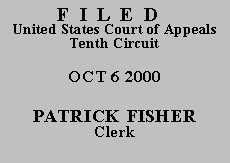

| FRED FITZGERALD, |
|
| v. | |
| JOE WILLIAMS, Warden, Lea County Correctional Facility; ATTORNEY GENERAL FOR THE STATE OF NEW MEXICO, |
Mr. Fitzgerald filed a petition pursuant to 28 U.S.C. § 2254 challenging his conviction and sentence on two grounds: (1) that the habitual offender enhancement of his sentences constituted cruel and unusual punishment and (2) that his sentencing violated double jeopardy. The magistrate judge filed proposed findings suggesting the cruel and unusual punishment claim be dismissed under procedural default and that the double jeopardy claim be denied on the merits. The district court adopted the magistrate judge's findings. The district court subsequently denied Mr. Fitzgerald's application for a certificate of appealability. A renewed application is before us now.
Mr. Fitzgerald did not directly appeal his convictions, but he did pursue state post-conviction relief. During his state post-conviction proceedings, he raised only the double jeopardy claims. Mr. Fitzgerald must demonstrate a showing of cause and actual prejudice or a fundamental miscarriage of justice to avoid procedural bar as to his cruel and unusual punishment claim. See Jackson v. Shanks, 143 F.3d 1313, 1317 (10th Cir. 1998) (citing Coleman v. Thompson, 501 U.S. 722, 730 (1991)).
We agree with the magistrate judge's conclusion that Mr. Fitzgerald cannot show cause and prejudice for the procedural default of his cruel and unusual punishment claim. There is no evidence that the factual and legal basis of the claim was not viable when he filed his state court post-conviction petition, nor is there evidence of interference by official that made compliance with the procedural rule impracticable. See Maes v. Thomas, 46 F.3d 979, 984 (10th Cir. 1995).
We also agree with the magistrate's determination that Mr. Fitzgerald cannot demonstrate a fundamental miscarriage of justice under McCleskey v. Zant, 499 U.S. 467, 502 (1991). There is no evidence of a constitutional violation that caused the conviction of one innocent of the crime, and Mr. Fitzgerald makes no allegation of actual innocence.
Mr. Fitzgerald's double jeopardy claim also fails. Mr. Fitzgerald contends that the additional habitual offender enhancements of his first sentence resulted in an eight year enhancement of his sentence for his second set of crimes and for his violation of his probation in the first case. In his 1995 plea agreement, Mr. Fitzgerald agreed that if he violated any conditions of probation or if he violated any law, the state could bring additional habitual offender proceedings against him. Mr. Fitzgerald also agreed to the enhancement in the event his probation was revoked, which it was. We agree with the magistrate judge's recommendation that Mr. Fitzgerald's double jeopardy claim must be dismissed because he bargained away this defense.
We agree with the district court that Mr. Fitzgerald has "failed to make a substantial showing of the denial of a constitutional right," 28 U.S.C. § 2253(c)(2), required to obtain a certificate of appealability.
Accordingly, we DENY Mr. Fitzgerald's request for a certificate of appealability and DISMISS the appeal.
Robert H. Henry
Circuit Judge
.
*.This order and judgment is not binding precedent, except under the doctrines of law of the case, res judicata, and collateral estoppel. The court generally disfavors the citation of orders and judgments; nevertheless, an order and judgment may be cited under the terms and conditions of 10th Cir. R. 36.3.